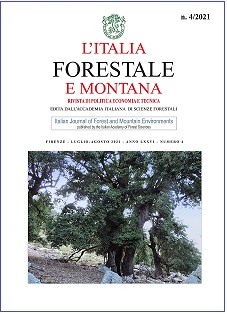Published
2021-09-15
Keywords
- embedded deforestation,
- tropical forests,
- food consumption,
- responsibility,
- forest-risk commodities
Abstract
Agriculture has always been a major threat to natural ecosystems, despite being essential for human food production. At present, particularly in the tropical and sub-tropical regions, agricultural activities are major pressure factors on forests and on the life cycles’ conservation of such crucial ecosystems. Contemporary societies, essentially urban and increasingly disconnected from natural and ecological processes, tend to forget, or simply not consider, responsibilities about such unsustainable pressures. Especially, the production of four commodities plays a central role in deforestation: beef cattle breeding, soybean and oil palm cultivation, and timber extraction. Production, transformation, transport and consumption processes of these commodities lead to forest degradation and deforestation, as a direct consequence of the agricultural frontier expansion. Recent scientific literature gives increasing importance to the role of deforestation as one of the main drivers of the planetary boundaries overcoming and to the connections existing between distant places on the planet with respect to food production and consumption, and their environmental and social impact. The aim of this work, based on a literature review conducted through keywords related to the scientific publications on the subject over the last twenty years, is to increase knowledge of these connections and their consequences, and to increase awareness in the scientific community and among citizens. The systematic literature review highlights the “hidden” responsibilities in the consumption of many food products that cause the disappearance and degradation of essential natural ecosystems. This reinforces the need for a paradigm shift to break the vicious circle of globally consolidated urban-rural and north-south dynamics.


